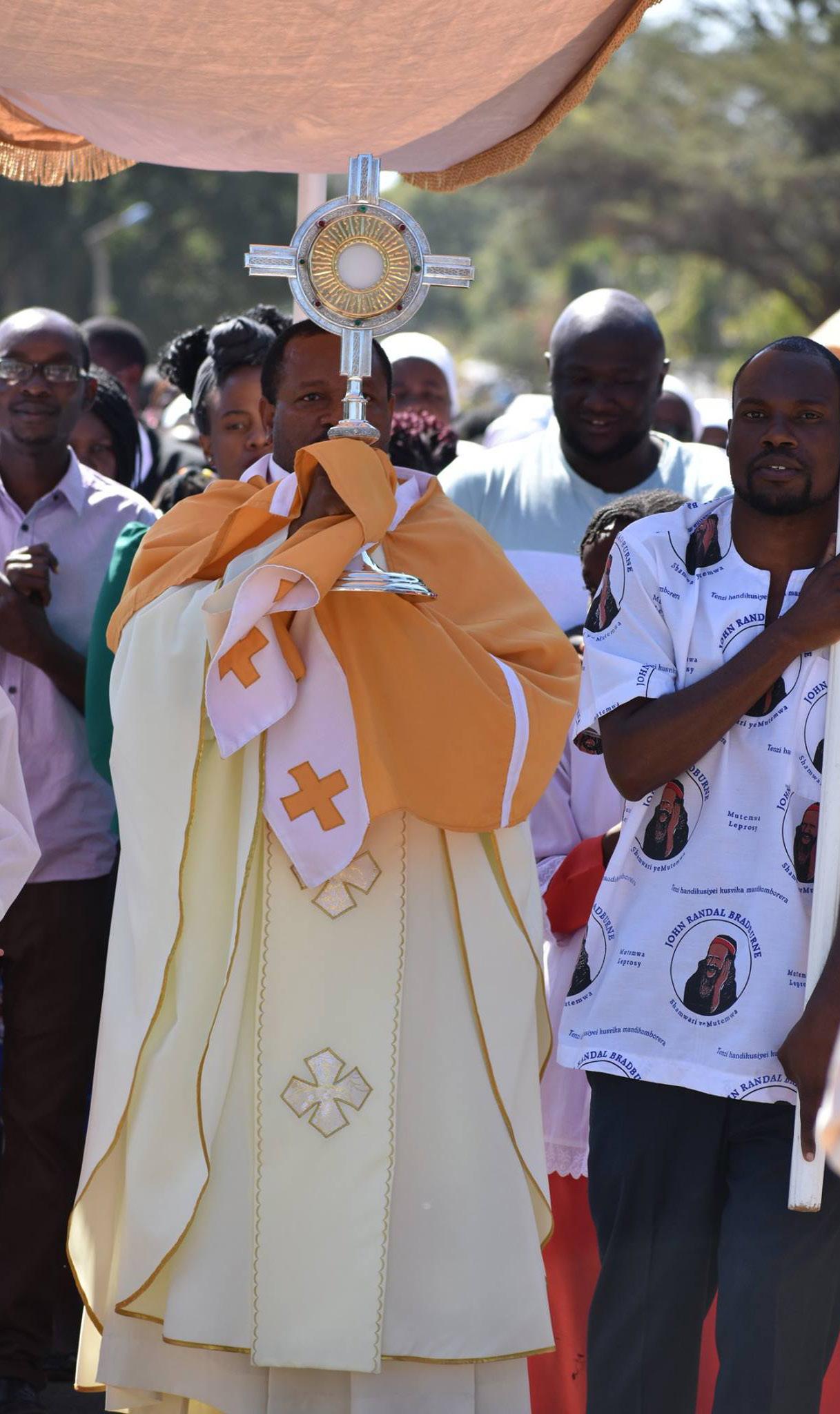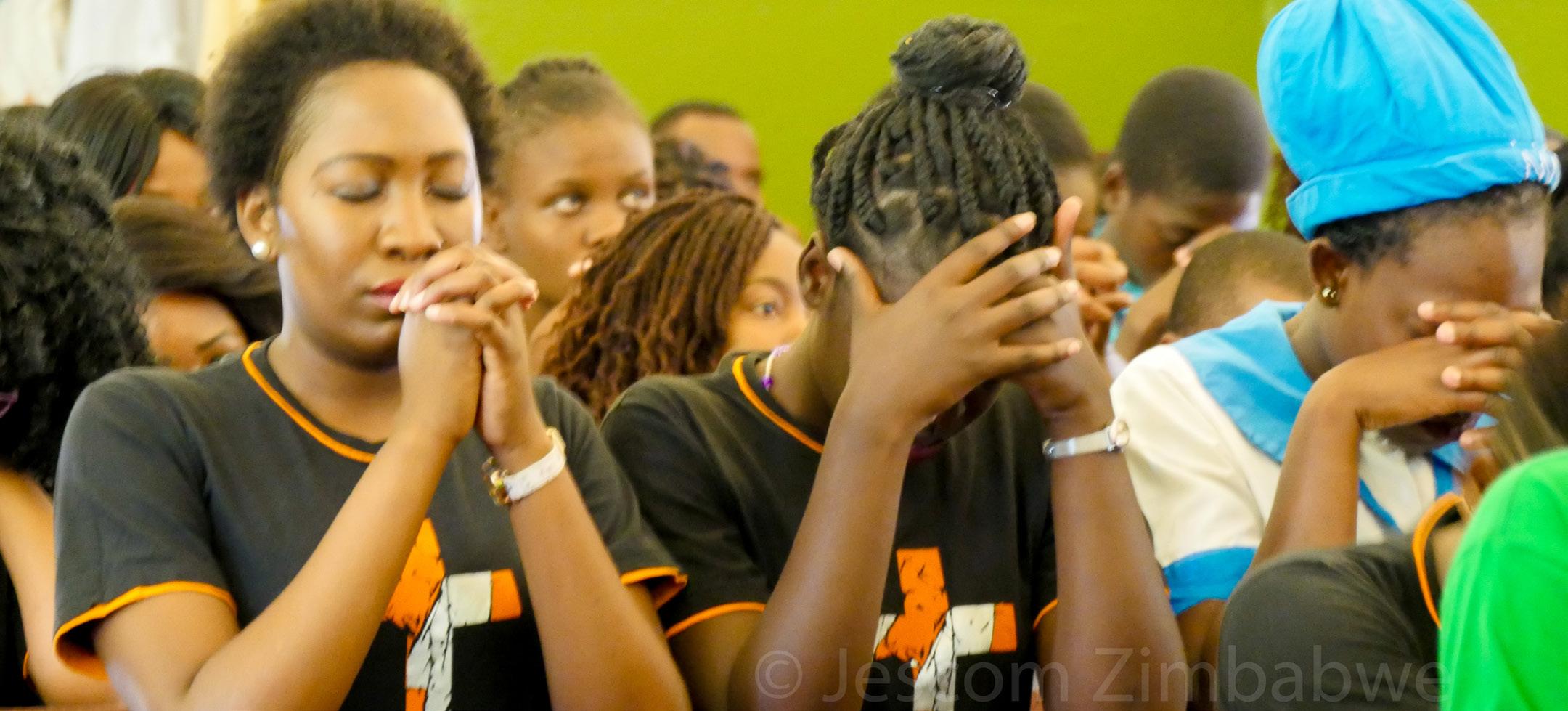
6 minute read
Virtual Eucharistic Participation
complementary to liturgical services in the real world. Nevertheless, it should not be forgotten that the current times are extra-ordinary and they call for equally extraordinary provisional means of sustaining the people’s faith in these difficult times. The Church, in her history went through very difficult times like persecutions where she had to celebrate Mass in hidden places such as catacombs. She had to find ways to sustain the people’s faith. While the Virtual Eucharistic Participation is never a substitute for the real-world Eucharistic celebration, there are ways one can make the best of Virtual
Advertisement

Eucharistic Participation.
How does one make the best of Virtual Eucharistic Participation?
Many of the faithful who participate in a Virtual Eucharistic celebration discover that there is a huge difference between going to Mass and simply watching Mass on a parish Facebook page or on other internet platforms. Some cannot help it but just feel so lost because the environment and atmosphere at church and at their houses is just irreconcilably different. Moreover, there tends to be many distractions at home and sometimes it is just difficult to concentrate at home. This should not be surprising because, “By its very nature the liturgy operates on different levels of communication which enable it to engage the whole human person.” For example, “the harmony of the rite, the liturgical vestments, the furnishings and the sacred space” (Sacramentum Caritatis 40). This is something a home cannot offer. Moreover, full participation in the Eucharist takes place when the faithful approach the altar in person to receive communion (cf. Codex Iuris Canonici, Canon 919). Be that as it may, under the current circumstances
where it is not possible to receive sacramental communion, participation at Virtual Mass remains necessary, important, meaningful and fruitful notwithstanding the limitations associated with the practice. In order to foster union with Christ their head, Christ’s faithful need to develop ways of differentiating participating in a Virtual Eucharistic Celebration from ordinarily watching TV or movies. It would be absurd to attend a Virtual Mass while lying on one’s back in bed with the laptop on one’s tummy, and occasionally attending to one’s cell phone or some other tasks. There is need to have the right disposition. One needs to prepare oneself so that one may find God in participating in a Virtual Eucharistic Celebration. It helps to have a moment of silence some minutes before the Virtual Mass. Prior to that one should have read the Scripture readings of the day and the cell phone should be silenced. TV and Radio should be also turned off. One should be well disposed on a couch or a chair, not reclining on the couch or lying on the floor. Then when the Virtual Mass begins one might need to follow, as appropriate, the liturgical gestures along with the on-screen congregation. Making the same physical gestures of prayer as other Catholics around the world may give one a sense of unity with them. Families can benefit from such fellowship. It is important to remember that “from listening to the word of God, faith is born or strengthened (cf. Rom 10:17)” and, “Christ does not speak in the past, but in the present, even as he is present in the liturgical action … The homily is meant to foster a deeper understanding of the word of God, so that it can bear fruit in the lives of the faithful” (Sacramentum Caritatis 45, 44 and 46). Virtual Eucharistic Celebration helps, especially in these trying times, to strengthen the faith of the people of God so that the word of God that they hear during their Virtual Eucharistic Participation may bear fruit in their lives and give them hope.
Spiritual Communion
As stated above, full participation in the Eucharist takes place when the faithful approach the altar in person to receive Holy Communion. But in the Covid-19 situation Spiritual Communion is valuable. It is necessary, therefore, to take a cue from the words of Pope Francis, after reciting a livestreamed Angelus prayer on 15 March 2020, he said “United to Christ we are never alone, but instead form one body, of which he is the head. It is a union that is nourished with prayer and also with spiritual communion in the Eucharist, a practice that is recommended when it isn’t possible to receive the sacrament.” Pope St John Paul II praised this practice and it was also recommended by saints such as St. Thomas Aquinas and St. Teresa of Jesus who were masters of the spiritual life (Sacramentum Caritatis 55).
Spiritual Communion is the practice of desiring union with Jesus Christ in the Holy Eucharist especially when one cannot attend Mass because of a grave reason, for example, due to the current Coronavirus Pandemic. In the 1700s, St. Alphonsus Liguori wrote a special prayer for spiritual communion, it says, “My Jesus, I believe you are really here in the Blessed Sacrament. I love you more than anything in the world, and I hunger to receive you. But since I cannot receive Communion at this moment, feed my soul at least spiritually. I unite myself to you now as I do when I actually receive you. Amen.” The faithful may use it during a Virtual Mass at the time of communion. If one sincerely follows these suggestions one may find God in participating in a Virtual Eucharistic Celebration.
God, Prayer and Covid-19 Fr Stephen Buckland SJ Philosophy Professor - Arrupe Jesuit University, Harare


Youth Pray during Youth Mass held every first Sunday of the month Who is to blame for the I don’t know what ‘5G’ is. The virus is not a living thing, COVID-19? Some say the Who am I to say that these but it certainly is a thing. coronavirus is a biological metal structures bristling Even if someone did make it weapon intended to destroy with disks and aerials in a lab, and is spreading it ‘the West’ and deliberately across the more advanced via 5G, why would God allow introduced by ‘our enemies’. countries could not be it? Why doesn’t God prevent Who are these ‘enemies’? capable of generating it? It can’t be because God Some say ‘the Chinese’ of or spreading such a is not powerful enough, nor course: everyone knows mysteriously infectious virus that God does not know or about their awful bushas SARS-CoV-2 that causes care enough about us: that meat markets (what sort COVID-19? I do know (or just wouldn’t be God. Since of people would eat bats?) think I know) that there is God created everything, I and their secret, high-tech no 5G in Zimbabwe, and think we have to say that laboratories specialising in the virus is spreading rather God is ultimately responsible virology (what other reason slowly here. Could it be for everything. could there be for research true? But as soon as we say of this kind?). Their oriental Let me stop making that we can see that it is a cunning failed them when fun of these outlandish very strange thing to say. their own virus took hold theories. The more serious To be ‘responsible’ is to be first in China itself… But question is the role of God responsible to someone or that was no doubt a cunning in this pandemic. How something. You and I can and cynical ruse to disguise should we think about God be (or fail to be) responsible their global malevolence. in relation to COVID-19? because there are others Others say it’s the ‘5G And how should we pray? to whom we must give networks’: those sinister God is, after all, Creator account. But to whom towers springing up across of everything and surely or what could God give the landscape are spreading that means that God is account? God not only made the disease. I don’t responsible for everything. everything but keeps it all in understand this, but then Mukai -Vukani No.77 | Mukai -Vukani No.77 | July 2020July 2020 || 88










